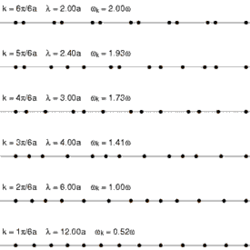PHZ3400 Sound: Difference between revisions
Jump to navigation
Jump to search
MatthewHoza (talk | contribs) |
MatthewHoza (talk | contribs) |
||
| Line 8: | Line 8: | ||
** Thermal energy can be used to measure resistivity. | ** Thermal energy can be used to measure resistivity. | ||
* Periodicity helps to simplify the problem of lattice vibrations. | * Periodicity helps to simplify the problem of lattice vibrations. | ||
* One atom moves with the frequency <math>\omega_0 = \sqrt{\frac{k}{m}}</math> | |||
** If we have many atoms moving together than they effectively have a larger mass, therefore they will have a smaller frequency. | |||
* Broken Symmetry | |||
* Collective Phenomenon - behavior changes when in a large group | |||
* Consider an <math>H_2</math> molecule. Assume one is at rest while the other moves. | |||
<math>ma = -\frac{dV(r)}{dt}</math> | |||
,where <math>V</math> is potential energy and <math>r</math> is radius. This can be rewritten as | |||
<math>m\frac{d^2r}{dt^2} = -\frac{dV(r)}{dt}</math> | |||
This equation cannot be solved via conventional methods, so we must somehow simplify it. Let us only worry about very small oscillations. This reduces our problem to a harmonic oscillator. Small oscillations can be described simply since it is parabolic at the minimum energy. | |||
Now we expand <math>V(r)</math> in Taylor Series (note <math>r_0</math> is the radius with minimum V) | |||
<math>V(r) = V(r_0) + V'(r_0)(r - r_0) + \frac{1}{2}K(r - r_0)^2</math> | |||
,where <math>K = \frac{d^2V}{dt^2}</math>.Notice that the second term is the derivative of <math>V</math> at <math>r_0</math>, which is a minimum, therefore the derivative is zero and this term can be ignored. Now we have | |||
<math>V(r) = V(r_0) + \frac{1}{2}K(r - r_0)^2</math> | |||
Now let <math>u = (r - r_0)</math> and we have | |||
<math>V(u) = V_0 + \frac{1}{2}Ku^2</math> and <math>\frac{dV(u)}{du} = Ku</math> | |||
==One dimensional mono-atomic chain== | ==One dimensional mono-atomic chain== | ||
Revision as of 00:06, 11 February 2009
Harmonic approximation: inter-atomic forces as springs
- If we put energy into a crystal the atoms will begin to vibrate.
- We are able to put energy into the crystal in two ways: Mechanical and Thermal.
- Mechanical energy are sound waves
- Thermal energy can be used to measure resistivity.
- Periodicity helps to simplify the problem of lattice vibrations.
- One atom moves with the frequency
- If we have many atoms moving together than they effectively have a larger mass, therefore they will have a smaller frequency.
- Broken Symmetry
- Collective Phenomenon - behavior changes when in a large group
- Consider an molecule. Assume one is at rest while the other moves.
,where is potential energy and is radius. This can be rewritten as
This equation cannot be solved via conventional methods, so we must somehow simplify it. Let us only worry about very small oscillations. This reduces our problem to a harmonic oscillator. Small oscillations can be described simply since it is parabolic at the minimum energy.
Now we expand in Taylor Series (note is the radius with minimum V)
,where .Notice that the second term is the derivative of at , which is a minimum, therefore the derivative is zero and this term can be ignored. Now we have
Now let and we have
and














